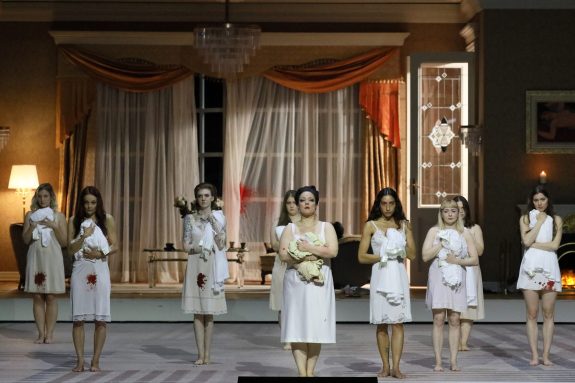 Germany Puccini, Tosca: Soloists, Chorus and Orchestra of the Bavarian State Opera / Andrea Battistoni (conductor). Nationaltheater Munich, 20.5.2024. (ALL)
Germany Puccini, Tosca: Soloists, Chorus and Orchestra of the Bavarian State Opera / Andrea Battistoni (conductor). Nationaltheater Munich, 20.5.2024. (ALL)

Production:
Production – Kornél Mundruczó
Set and Costume designer – Monika Pormale
Lighting designer – Felice Ross
Video – Rūdolfs Baltins
Dramaturgy – Kata Wéber, Malte Krasting
Chorus master – Christoph Heil
Cast:
Floria Tosca – Eleonora Buratto
Mario Cavaradossi – Charles Castronovo
Scarpia – Ludovic Tézier
Cesare Angelotti – Milan Sijanov
Sacristan – Martin Snell
Spoletta – Tansel Akzeybek
Sciarrone – Christian Rieger
A shepherd boy – Tölzer Knabenchor Soloist
A jailer – Pawel Horoddyski
Puccini’s operas are masterpieces of drama, with sublime music and an extraordinary ability to write for singers. They are rarely overly long, and each measure counts (although some operas could delve deeper into character psychology). A production’s success begins with trusting the composer.
As you might guess from this introduction, this is not what Kornél Mundruczó, a filmmaker of great talent who previously gave us a riveting production of the The Makropolous Affair (review here) in Geneva, chose to do. Setting the action during Pasolini’s filming of ‘The 120 Days of Sodom’, Mundruczó’s concept for Tosca diverges significantly.
In this adaptation, Angelotti (Milan Sijanov) is part of the Red Brigades. It is important to remember that these are not freedom fighters or artists but an unjustifiably violent and infamous terrorist group. Do the artists realize that romanticizing such terrorist groups, regardless of nationality, is simply shocking?
Here, Cavaradossi (Charles Castronovo) is portrayed as a filmmaker like Pasolini, rather than a painter. It makes no sense that he should ask for brushes from the Sacristan (Martin Snell) and celebrates Napoleon’s victory at Marengo. The third act aria ‘E lucevan le stelle’ takes place as Cavaradossi/Pasolini sets up projectors to simultaneously show five excerpts from his films. How can one focus on the music when overwhelmed from all sides?
There are also many nude characters that may reference Pasolini but primarily seem intended to shock and scandalize, including a massage table that remains onstage for only five minutes. In short, it is a concept superficially plastered onto an opera that is sufficient on its own.
Yet the director occasionally knows how to direct actors and find ideas. This is evident when Tosca (Eleonora Buratto) enters the church after Scarpia’s arrival: the police recognize her and want to take photos with her. There is also a genuinely touching moment at the end of the second act when the former victims of Scarpia (Ludovic Tézier) gather around Tosca.
The musical level is uneven. Andrea Battistoni’s conducting is full of vigour and drama, but his orchestra was very loud. This is often the case in Munich, especially at premieres, but this exceeded anything I had heard before. In a rare occurrence for a conductor, the Battistoni was booed after the intermission.
Overall, the tempos were lively, except for a too-slow ‘Recondita armonia’ that complicated life for the tenor Charles Castronovo, who struggled with his pitch against the decibels of the orchestra. Eleonora Buratto, taking on her role for the first time, has a powerful voice with beautiful high notes and genuine Italianate quality. But the standout performer of the evening was undoubtedly Ludovic Tézier. Technically and vocally, he was the most capable of expression and communication as a stage performer. The Bavarian State Opera Chorus in the ‘Te Deum’ was superb.
The audience will have many opportunities to revisit this production. Some issues typical of premieres might fade. It will be revived for the Munich opera festival in July with Lise Davidsen, Jonas Kaufmann, and Bryn Terfel. Big names, but will Puccini be there?
Antoine Lévy-Leboyer

We booed the production, not the conductor. Too much gratuitous violence and nudity.
The conductor was not good at all. The orchestra played far too loud.
The silent prelude with wedding couple flanked by a dozen naked men and women and all the photo taking was an abomination. The marvelous thing about Tosca is when music explodes and the drama begins the second the curtain goes up. The entire Mundruczó concept was absurd. Angelotti are made to be members of the Sixties Brigate Rossea violent group that terrorized Italy in the sixties. Cavaradossi singing Vittoria!! to news of Napoleon’s Marengo battle that happened two centuries earlier. I found the movie pictures projected during the ‘E lucevan le stelle’ so bothersome that I had to shut my eyes. The cast in Munich was wonderful, especially Tézier as Scarpia. So was Battistoni and the chorus was superb in spite of Mundruczó having soldiers brutally throwing men and women into a pile and beating them throughout the Te Deum. Too much violence, nudity and added intrusion in an opera that already had all it needs.
I saw the livestream of this production, and then I watched the Covent Garden film of Act II with Callas/Cioni/Gobbi. Buratto has a long way to go to really inhabit the role – adequate voice but superficial acting. Kaufmann has really aged and is OK. Tézier OK too. The production was yet another example of opera as socio-political agenda. The Te Deum scene was very gross, and the nudity was ridiculous. I feel sorry for performers who have to make money by appearing naked in an opera. We will continue to have this kind of production if opera stars – who have clout – agree to appear in such junk. The audience also with their applause encourage such nonsense.